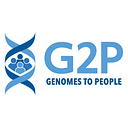A Life Saved by Expanded Newborn Screening
For a time-sensitive genetic disease, early detection is everything.
by Carolyn Philstrom, Independent SMA advocate*
The news brought tears of joy to my eyes: Large-scale studies of genomic sequencing in newborns are finally getting underway. As the mother of a child whose life was saved by newborn screening, I’ve been advocating and praying for this day for over five years.
My son Edan was one of the first humans ever to receive a Spinal Muscular Atrophy diagnosis from newborn screening, allowing treatment before the onset of symptoms. Those symptoms can begin very early, and can be extremely serious; SMA used to be the most common genetic cause of infant mortality, but in many parts of the world, that is changing thanks to newborn screening and new treatment options. Thanks to newborn screening and gene therapy, my son just started kindergarten with no signs of SMA.
When Edan was born in October 2018, Minnesota had recently become just the third state to screen for SMA in newborns. Edan was treated at two weeks old, eventually receiving the (then) new gene therapy Zolgensma. We traveled to a clinical trial site in Madison, Wisconsin, to receive the one-time treatment. Minnesota had newborn screening for SMA but no treatment for it; Wisconsin had the miracle drug but no screening. All over the country, babies were missing their chance for early treatment of SMA because of its omission from newborn screening panels. On that trip, my husband and I joined the group effort and odyssey, and I do mean odyssey, of getting all 50 states to screen for SMA. State by state. Just one disease, and it took years.
When we met with Wisconsin Governor Tony Evers, it was the only time I ever saw our pediatric neurologist show frustration as she described the terrible irony of having access to the treatment, but not the testing. As we say in the SMA community, time is motor neurons. And there are other genetic diseases even more acute and time-sensitive than SMA. When we did our first of two national news stories on this topic, one of the reporters cried when I explained that even though this miracle of gene therapy finally existed, some babies were not getting it in time.
When Edan was diagnosed, I read Dr. Siddhartha Mukherjee’s book The Gene and fell in love with genetics. I kept pondering how to improve the process of adding newly actionable diseases to state newborn screening panels. This made me wonder: “Why don’t we just sequence the genomes of all humans at birth and at least screen for all actionable diseases?”
I researched who was already working on this idea. Just days before, Dr. Robert Green of the Genomes2People (G2P) Research Program had written an article on the topic. I emailed him, figuring it was a long shot. He and his team met with me three times and helped me understand this idea. I never in my life thought I, a Lutheran pastor from Minnesota, would be talking with Harvard scientists. They helped me learn and advocate. Because God works through science, and because there is no such thing as other people’s children.
This is an issue that impacts us all. In the era of gene therapies, we must be able to get them to the babies in time. The reason we have COVID vaccines is because we were able to sequence the genome of the virus. We should apply this life-saving technology to humans, and upon birth is the ideal time to do it. It’s hard to state the scale and the importance of this work and what this will mean for human health. I am now a proud supporter of Dr. Green’s Genomes2People project, and I encourage anyone interested in advancing this remarkable research to support the field in any way they can.
Gregor Mendel, clergy turned geneticist, famously said, “I am convinced that it will not be long before the whole world acknowledges the results of my work.” That day has finally arrived. Thanks be to God.
*Rev. Philstrom is not connected with Mass General Brigham or Harvard Medical School. All opinions are her own. She is an ordained minister in the Evangelical Lutheran Church in America (ELCA) and works as a healthcare chaplain.
